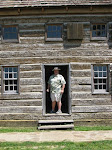 |
| J.S. Bach E.G. Haussman, Germany, 1746 |
I was introduced to the music of J.S. Bach as an infant at Mount Calvary Lutheran Church in my little hometown in the mountains of Maryland. The church already had been baptizing members of my father's family for over seventy years. We were a large family within the larger church family. One aunt was the principal organist while several aunts, uncles, and cousins held various position in church administration and in the choir. In the summer of my ninth year our family moved leaving behind not only familiar places but also family linkages to Mount Calvary Lutheran Church. I left with a strong faith reinforced in part by Bach's profound music. Although faith faced some challenges in my revolutionary days the awe and appreciation for Bach never waned.
In this commemorative post Bach's music is his biography. No need for names, dates, places, and details. Let the music speak for him.
From the St. Matthew Passion, here is the final recitative and chorus, a lullaby to Jesus as he lies in his tomb:
Here is a familiar piece attributed to Bach, Toccata & Fugue in D minor, BWV 565, performed by young Dutch organist, Gert van Hoef:
Music’s ultimate end or final goal…should be for the honor of God and the recreation of the soul.Johann Sebastian Bach - Leipzig, 1738








.jpg)









